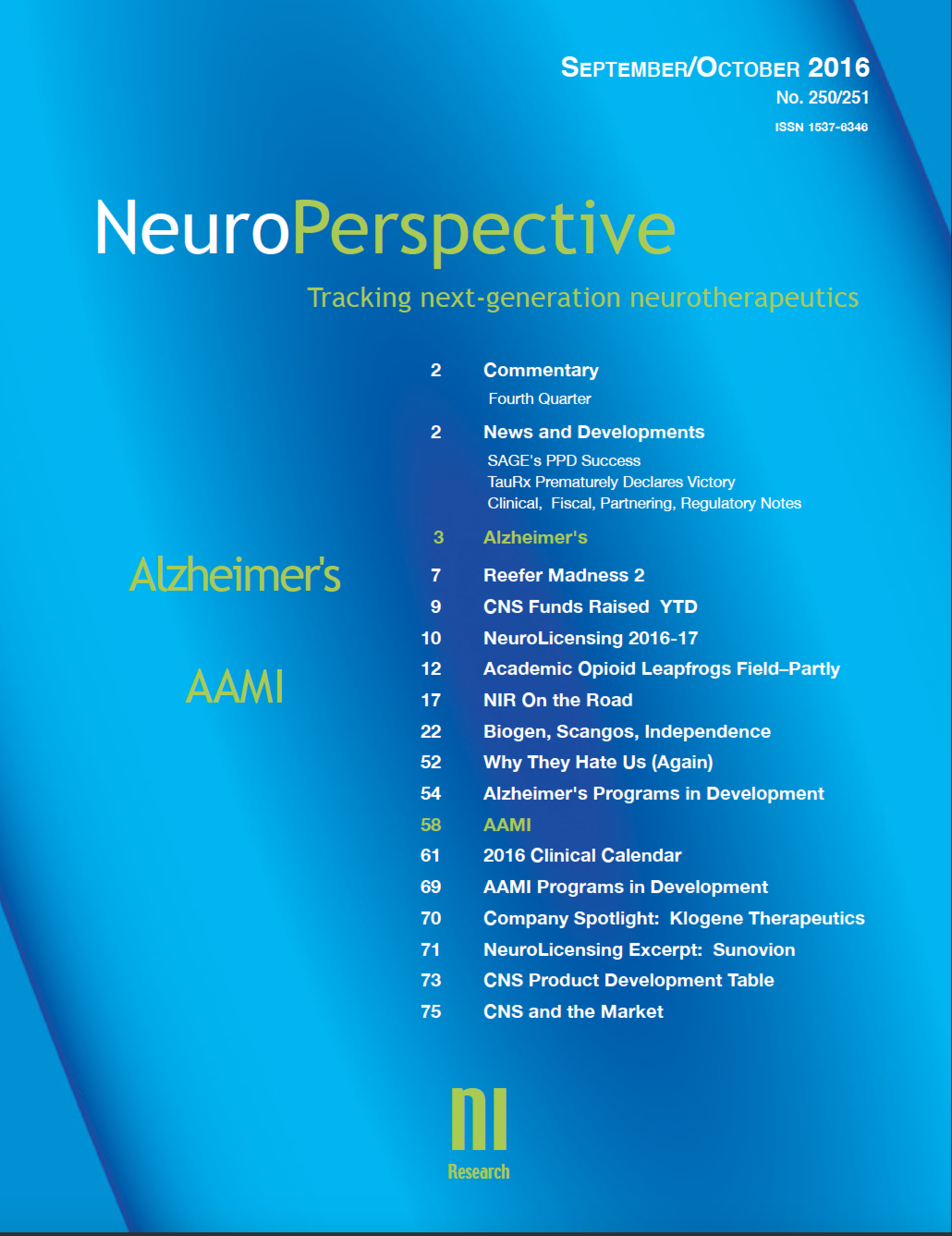NeuroPerspective has released its Summer 2023 issue, featuring comprehensive reviews of the Psychedelic Therapeutics area, as well as neurotherapeutics programs addressing Parkinson’s and Multiple Sclerosis.
There is no area in neurotherapeutics that is in such frequent and potentially substantive transformation as Psychedelics. Along with Alzheimer’s, it has become one of the two areas to which NP returns on an annual basis. MAPS has successfully completed its second PhIII trial of MDMA in PTSD, and while these studies were small scale in comparison to most pivotal studies, the pressure from advocacy groups, particularly military veterans, is so intense that we expect the FDA to approve MDMA by the end of 2024. Compass Pathways is the other PhIII-stage psychedelic company, it has begun enrollment in two PhIII trials of psilocybin in Treatment-Resistant Depression, in the wake of their PhIIb success. They are about two years behind MAPS in their clinical development timeline.
There are well over 100 companies that have been founded in the Psychedelics space, some of which have already gone out of business, and with the funding spigot turned down to a trickle, culling and consolidation are the major corporate trends in this area. This issue of NP focuses on fifty of the more credible entrants, including classic psychedelic companies like Atai, Beckley Psytech, Biomind, CaamTech, Compass, Cybin, Enveric, GH Research, Gilgamesh, Lusaris, MindMed, Mindset, Mydecine, Psylo, Silo, Small Pharma, Terran, and TRYP. There are also several companies in the dissociative and empathogen categories, including Tactogen and Freedom Biosciences.
The issue also looks at some of the fundamental issues framing the discussion around the viability of Psychedelics from both a clinical and commercial viewpoint. None looms larger than the debate around whether the hallucinogenic experience is ‘a bug, or a feature.’ Some very capable companies are betting that the hallucinations associated with classic psychedelics are superfluous, that the impact of these drugs is achieved by hypercharging neuroplasticity. Delix Therapeutics (which has a Featured review), Onsero Therapeutics, and Psilera are prominent in this group, relying upon chemistry expertise to parse the neuroplastic from the hallucinogenic. Other questions addressed at length are: What role does psychotherapeutic prep and integration play in psychedelic therapies, and what protocol variants (number of doings, booster sessions) many be either optimal, or viable.
The Parkinson’s area continues to be the domain in neurodegeneration where the most mundane (but meaningful) of symptomatic therapies are being developed alongside the most adventuresome and risky interventions, including cell therapies (Aspen, Bayer) and gene therapy (e.g. Lilly/Prevail, Neurocrine/Voyager). Alpha-synuclein continues as a target of interest, though its performance as a target has been mixed at best. Roche/Prothena have launched a major PhIIb trial, Takeda/AstraZeneca are in PhII. BioArctic and Sanofi/ABL Bio, UCB/Neuropore, and AC Immune are among the numerous programs also active with this target. GBA (e.g. Lilly/Prevail, BIAL, and Vanqua) and LRRK2 may be the most promising genetic targets, and LRRK2 appears to be potentially relevant to idiopathic PD as well (e.g. Biogen/Denali, Neuron23, Servier/Oncodesign). Other neuroprotective options are in development by companies including AbbVie/Mission, NRG Therapeutics, and Lucy Therapeutics. In terms of improved symptomatic options, Cerevel is well into PhIII, Cerevance, Neurolixis, and Intra-Cellular are earlier-on.
Multiple Sclerosis is in some ways the success story of the neurodegeneration area, with multiple disease-modifying options, the CD20 targeting drugs (e.g. Ocrevus and Kesimpta) having attenuated the choice between efficacy and safety that characterized earlier-generation options. BTK inhibitors had been expected to be the next-gen mechanism of promise, but safety issues have cropped up with most of the leading programs. Sanofi/Principia and Merck Serono should have PhIII results during 2023-24, with Roche a year behind.Progressive MS continues to be underserved, and regenerative therapies have thus far been problematic clinically.
The issue also includes a Company Spotlight appraisal of Delix Therapeutics; commentary on lecanemab and donanemab in Alzheimer’s, and regarding Acadia’s pricing of Daybue for Rett Syndrome. As always, there is coverage of significant clinical, fiscal, partnering, and regulatory events from 2Q:23. 116 pages.

